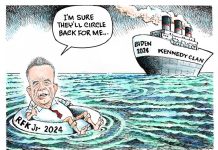We’re still waiting to see what our state lawmakers this session ultimately will or won’t do in the way of banning books from public libraries and limiting what teachers can teach. But history tells us that when powerful people try to limit free people’s access to knowledge or censor what we see and read, it tends to end badly for them.
This doesn’t just apply to the rigid right-wing ideologues in the Indiana General Assembly or the book-banning school boards in Tennessee that have made headlines lately. Even the upper strata of the Hollywood liberal elite have learned how censoring something can backfire.
Just ask Barbara Streisand, who has a whole phenomenon in this regard named after her. No greater authority than knowyourmeme.com defines the “Streisand Effect” as “the unintended consequence of further publicizing information by trying to have it censored. Instead of successfully removing the information from the public, it becomes even more widely available than before as a backlash against the censorship.”
For Streisand, this was the result in the early days of the internet after she tried to force public entities to remove online photos of her beachfront Malibu home. The internet responded, as it has, does, and will: Images of Streisand’s home went viral.
More recently, the school board in McMinnville, Tennessee, has taken flak for banning the classic graphic novel “Maus.” Offended by a couple of swears in the book, the school board voted that “Maus,” Art Spiegelman’s decades-old, Pulitzer Prize-winning retelling of his parents’ Holocaust experience, had to go.
What happened? “The Complete Maus” rocketed to No. 1 on Amazon’s bestseller list. One comic book store operator who had personally felt the power of the work raised more than $30,000 on gofundme.com overnight, vowing to purchase copies of “Maus” and send them to anyone in McMinnville schools who wanted one.
Spiegelman commented that this was just like when President Vladimir Putin outlawed the book in Russia. “The small publisher sold out immediately and has had to reprint repeatedly,” Spiegelman said of Putin’s genius idea.
The freedom to think, read, write, create and be inspired by the written word and the arts is in America’s DNA. Those who threaten these freedoms become part of a story, too — just never the good guys.
Mitch Daniels, the former governor of Indiana and the current president of Purdue University, knows a little about this. After historian Howard Zinn died in 2010, Daniels, as governor, emailed various state education officials. We learned when those emails came to light in 2013 that Daniels had written of Zinn, a World War II veteran, “This terrible anti-American academic has finally passed away,” and urged “this crap” — Zinn’s “A People’s History of the United States” be purged from Hoosier classrooms.
What happened? That book, first published in 1980, soared to the top of Amazon’s history bestsellers. Indiana public libraries were overwhelmed by demand. You can read more about Daniels’ effort to ban a historian he didn’t like, and the fallout, in books such as “Zinnophobia: The Battle Over History in Education, Politics, and Scholarship,” by David Detmer.
Why does this keep happening? Call us crazy, but we are beginning to suspect our leaders may not be very well read.




